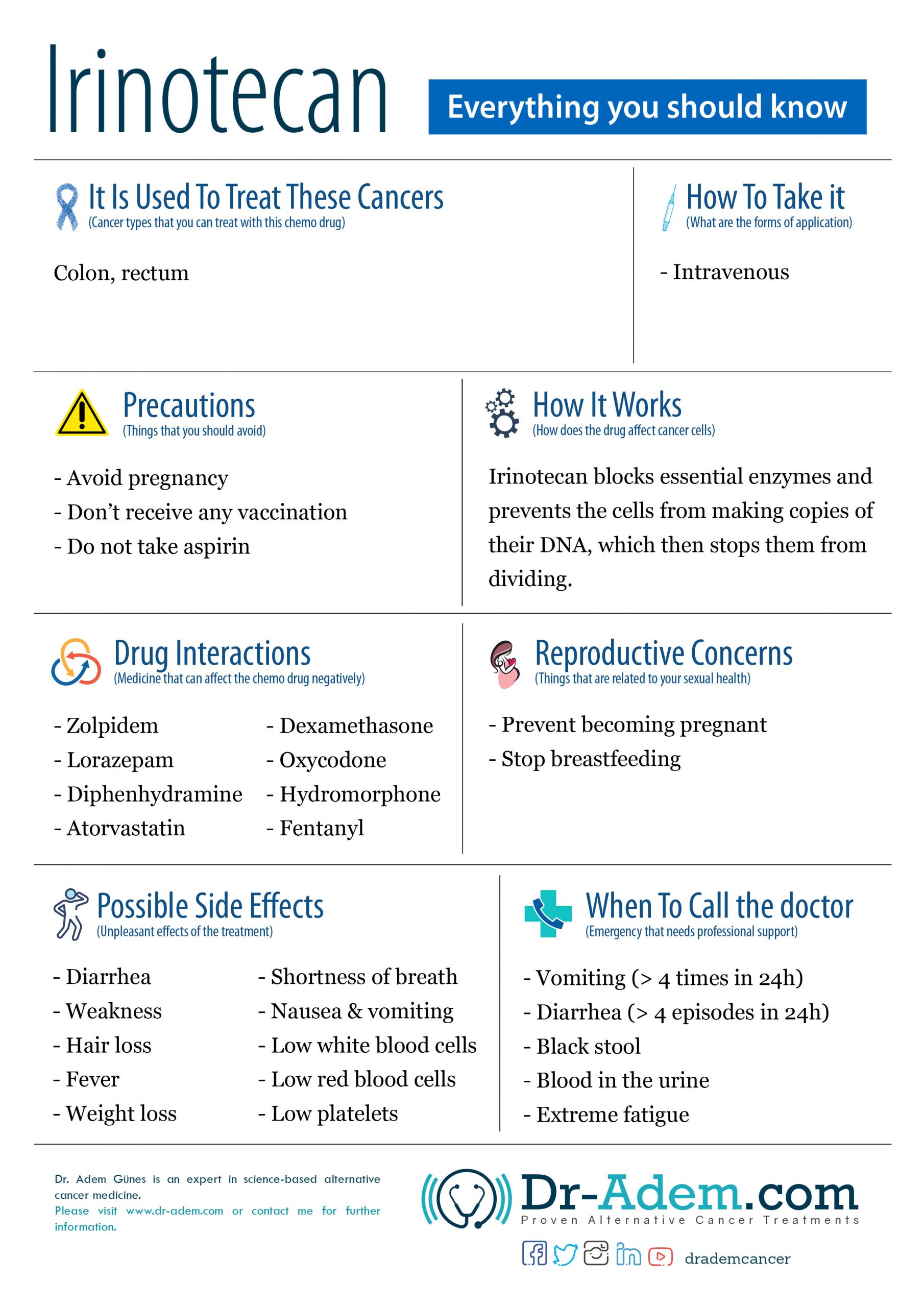Fact Sheet – Everything You Should Know
In this Irinotecan fact sheet, you’ll get to know about the precautions, usage, possible side effects, and the types of cancer that you can treat with this chemo drug.

Embed this Infographic on your site:
<a href='https://dr-adem.com/irinotecan-fact-sheet/'><img src='https://dr-adem.com/wp-content/uploads/2019/11/Irinotecan2-scaled.jpg' alt='Irinotecan Fact Sheet'/></a>Here’s the Irinotecan fact sheet to get detailed information about Irinotecan
It Is Used To Treat These Cancers
(Cancer types that you can treat with this chemo drug)
- Colon
- Rectum
How To Take it
(What are the forms of application)
- Intravenous
Precautions
(Things that you should avoid)
- Avoid pregnancy
- Don’t receive any vaccination
- Do not take aspirin
- Let your doctor know if you have any liver problems
- Do not use St. John’s wort
Mechanism of Action of Irinotecan
(How does the drug affect cancer cells)
Irinotecan belongs to the topoisomerase inhibitors (Topoisomerase I inhibitors subgroup). It binds to the topoisomerase I complex, preventing the DNA strands to connect themselves again after they open themselves for replication, breaking the DNA structure definitively. This process leads to apoptosis (programmed cellular death).
Drug Interactions
(Medicine that can affect the chemo drug negatively)
- Zolpidem
- Lorazepam
- Diphenhydramine
- Atorvastatin
- Dexamethasone
- Oxycodone
- Hydromorphone
- Fentanyl
Reproductive Concerns
(Things that are related to your sexual health)
- Pregnancy prevention during and until 6 months after the treatment (men and women)
- Stop breastfeeding
- Consider sperm freezing if willing to bear children
Possible Side Effects
(Unpleasant effects of the treatment)
- Diarrhea
- Loss of appetite
- Weakness
- Fatigue
- Hair loss
- Fever
- Weight loss
- Liver and kidney toxicity
- Malaise
- Cholinergic syndrome (overstimulation of the vagal nerve): low blood pressure, cold sweat, dizziness, light confusion
- Shortness of breath
- Nausea & vomiting
- Low white blood cells: raise the risk of bacterial infection
- Low red blood cells: can lead to fatigue, general lack of interest and drive to be active
- Low platelets: can lead to bleeding (nose, gums) and in extreme cases to internal bleeding (intestinal, brain, joints)
- Infertility
When To Call the doctor
(Emergency that needs professional support)
- Vomiting (>4 times in 24h): can lead to severe dehydration and electrolyte disbalance
- Diarrhea (>4 episodes in 24h): can also lead to severe dehydration and electrolyte disbalance
- Black stool: can be a sign of intestinal bleeding
- Blood in the urine
- Extreme fatigue: can be a sign of severe anemia (low blood cells)
- Fever > 37,8°C


